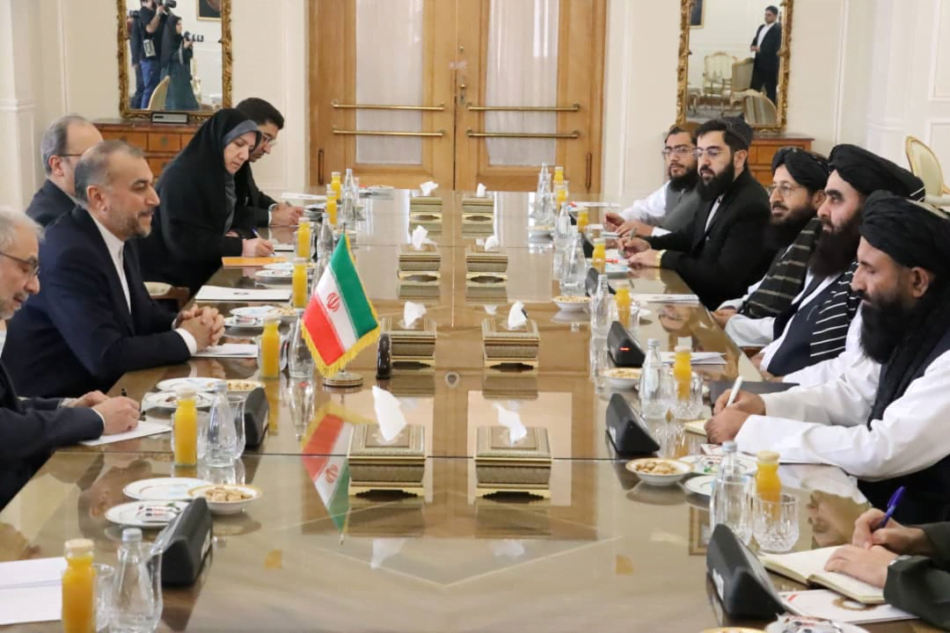Amir Khan Muttaqi, the Acting Minister of Foreign Affairs of Afghanistan’s Taliban-led government, recently concluded a significant visit to Tehran. While his primary agenda was attending an international conference supporting Palestine, Muttaqi’s trip encompassed far more, symbolizing the intricate diplomatic ties between Afghanistan and Iran.
Iran’s Ambivalent Stance Towards the Taliban Regime
A complex blend of diplomatic engagement and underlying tensions mark Iran’s relationship with the Taliban government. Despite not officially recognizing the Taliban regime, Iran maintains a pragmatic approach, allowing Taliban representation in the Afghan embassy in Tehran and keeping its embassy operational in Kabul after the fall of the previous government.
The Helmand River Dispute: A Recurring Point of Contention
A longstanding issue overshadowing Afghan-Iran relations is the Helmand River water dispute. Originating from an agreement during Musa Shafiq’s tenure as Afghan Prime Minister, the dispute revolves around water allocation claims. Iran accuses Afghanistan of non-compliance, while Afghanistan insists on adherence, citing regional drought impacts.
It is unclear whether the water issue in Helmand’s river was discussed during Muttaqi’s recent visit to Tehran. However, Iranian officials have previously expressed concerns regarding this issue, specifically in relation to the Taliban government in Afghanistan. This issue has garnered more attention since the Taliban’s return to power.
Muttaqi’s Advocacy for Regional Cooperation
Muttaqi engaged with key Iranian officials in Tehran, including Foreign Minister Hossein Amir Abdullahian and Special Envoy for Afghanistan Hassan Kazemi Qomi. His interviews with Iran’s Fars News Agency and IRNA News Agency highlighted the Taliban government’s willingness to engage in close political, commercial, and cultural exchanges with Iran. He also addressed the Taliban government’s commitment to facilitating the return of Afghan refugees.
Hassan Kazemi Qomi, Iran’s President’s Special Envoy for Afghanistan, was involved in the discussions during Muttaqi’s visit. His participation in these talks is notable, given his position and the current state of Afghan-Iran relations.
According to Qomi’s tweets, the discussions focused on accelerating bilateral agreements, trade facilitation, regional initiatives, and judicial cooperation. Qomi’s statements suggest a mutual interest in strengthening bilateral relations and cooperation across various domains, particularly emphasizing border security.
The Humanitarian Crisis: Afghan Refugees in Iran
The visit also cast light on the pressing issue of Afghan refugees in Iran. Reports of expulsions and restrictions on Afghan refugees highlight a significant humanitarian challenge, with Iran grappling with an influx of refugees amid economic and political pressures.
In addition, there have been reports in the media that Afghan refugees in Iran are being harassed by the Iranian security forces and, in some cases, by ordinary Iranians. Many Afghans have been angered by some viral footage on social media that shows the brutal torture of some Afghan refugees by Iranian security guards.
Muttaqi’s Solidarity with Palestine
At the international conference, Muttaqi’s speech centered on the plight of Palestinians, criticizing what he termed as “atrocities by the Israeli regime in Gaza.” He called for a more proactive role from Islamic nations in addressing Palestinian challenges. He advocated for a new world order based on justice and equity.
A Delicate Diplomatic Balance
Amir Khan Muttaqi’s Tehran visit underscores the nuanced and delicate diplomatic relations between Afghanistan and Iran. It reflects a balance of historical tensions, shared concerns, and efforts for constructive engagement. This visit and previous high-level interactions like Mullah Baradar’s Tehran visit highlight the evolving dynamics of Afghan-Iran relations.





